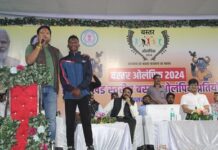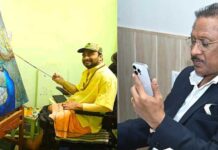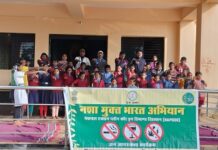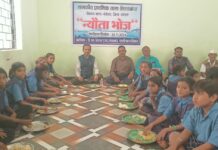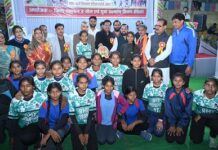MUMBAI: Nawazuddin Siddiqui’s recent appearance on Pakistan television, in a series of commercials by a home appliances brand, has proved to be a mixed bag for the Bollywood actor. The thinking audience hasn’t taken kindly to the ad’s punchline which amounts to doing dhulai (an Urdu slang for beating up) of your wife in case she acts smart with you. Social media has gone hysterical with its trolls, denouncing it as sexist and one that reinforces male chauvinistic attitudes. But fans of Siddiqui are delighted to see him share screen space with Pakistani actress Ayesha Khan.

Gulzar has penned the lyrics for an upcoming Pakistani film, Mehrunnisa V Lub You. The film’s first teaser, which was launched last month, has him giving the voice-over too
Siddiqui has emerged as the unlikely star of the show. Unlikely, because he isn’t one of those matinee idols the producers/directors would traditionally want to cast for brand endorsements — especially on this side of the border. A Ranveer Singh flashing a broad grin — and his ever-so-agile moves — for a toothpaste or shampoo commercial, or an Arjun Kapoor doing that oh-so-filmi tilt of the head that you have come to associate with Dev Anand or Rajesh Khanna, when promoting a mobile phone, would have greater star value any day. But, this isn’t about the appeal of mainstream Bollywood as much as it is about Pakistan caring so much for it. Or, how do you explain the biggest brands in the country today opting for the likes of Alia Bhatt, Deepika Padukone, and Kareena Kapoor Khan to promote their wares, even as fire is routinely exchanged at the Line of Control as well as on various media fronts.

Ayesha Khan and Nawazuddin Siddiqi in a television commercial
Katrina Kaif, Priyanka Chopra, Shraddha Kapoor, Yami Gautam, and Esha Gupta have endorsed one Pakistani brand or the other — be it green tea, an android, or a fairness cream.
Interestingly, although the self-imposed ban on Pakistani artistes by the Indian Motion Pictures Producers Association (IMPPA) has stayed till date, Indian talent continues to be approached for different Pak TV and film projects. Celebrated songwriter and filmmaker Gulzar recently penned the lyrics for an upcoming Pakistani film, Mehrunnisa V Lub You. The film’s first teaser, which came out last month, has the veteran giving the voiceover too. T-Series is releasing the film’s soundtrack which features singer Sukhwinder Singh.

Naseeruddin Shah on the set of Zinda Bhaag
Actor-director Jawed Sheikh is shooting Wajood, with a 19-year-old Tollywood actress, Aditi Singh, in Turkey. Sheikh is a supporter of cross-border cultural collaborations. He has also featured in Bollywood films like Om Shanti Om (2007), Namastey London (2007), and Tamasha (2015). Indian telly actress Reyhna Malhotra, who was seen in Ishqbaaz, features in Jackpot, a film by Shoaib Khan and Khurram Riaz. She recently finished shooting in Thailand, with Pakistani co-stars, Inayat Khan, Noor Hassan and Sanam Chaudhry.

Shahzad Gul with Saroj Khan shooting for Ghar Kab Aao Ge
Perhaps, the most exciting will be to see Sanjay Dutt in Girish Malik’s Torbaaz. It will be former Pakistani skipper Rameez Raja’s maiden venture as he has provided creative inputs to the action flick.
Different location
Since it is often difficult for artistes in India and Pakistan to move between the two countries, especially for work, a neutral venue is considered best for the shoot. This is usually Dubai or Bangkok. Nawazuddin’s TVC was also shot in Dubai, in December last year. This was the time when India and Pakistan were still reeling from the aftermath of the Uri attack. “The shoot took place over a single day,” reveals Armughan Hassan, co-director. “But we managed, because we had an amazing team, especially Siddiqui!”

Sara Khan shot for a TV serial Leikin in Pakistan earlier this year
There are a fortunate few who make it through the diplomatic red tape. Bigg Boss 4 contestant Sara Khan was in Karachi in January this year where she shot for a drama serial, Leikin. This was her second time in town. Earlier, she had come over to record actor-producer Humayun Saeed’s play Bey Khudi.
For his latest, titled Shor Sharaba, famed Lollywood producer Sohail Khan got Mumbai-based film director Hasnain Hyderabadwala (Ya Rabb, 2014) to come to Lahore in April 2016. Khan says, “It took seven months getting clearance letters for Hasnain, because he required a work permit. Once he was here, we made sure that we’d complete the entire shoot — the talkie portions and songs — in a single, 50-day spell.”

Ahsan Khan, Mustafa Qureshi and Achint Kaur in Sultanat
A year on, as the film is ready to hit theatres in Pakistan Hyderabadwala has already set a precedent by being the first Indian movie director ever to work across the border.
Hyderabadwala’s association with Khan goes back to the days of The Killer (2006), the Irrfan Khan-Emran-Hashmi-starrer which was one rare Indo-Pak joint production. Later, they came together for Jashn (2009). Both these were small-budget films, and although they didn’t cut it at the box office, Sohail Khan wasn’t deterred. He says he’d trust the vision of a Bollywood-trained director (such as Hasnain) better than local talent. “Most people who’re making films [in Pakistan] these days are not qualified to be in the field,” he declares.

Director Hasnain Hyderabadwala (left) and Mustafa Qureshi on the set of Shor Sharaba
Producer Khurram Riaz (of Jackpot) subscribes to the same belief. So he hired the services of Anubhav Bhansal, a well-known DoP in Bollywood, to cinematograph his film. Riaz also got the equipment from India, over to Thailand.
Bhansal is required for another shooting spell which willl take place in Lahore. Riaz is hopeful there won’t be any problem in getting him the visa, despite the tense situation at the border. “There are only a few circles/groups that are against unity or peace between India and Pakistan,” he says. “Otherwise the artistes and technicians are always ready to support each other, and they are open to the idea of cross-pollination.”

Neha Dhupia and Moammar Rana in Kabhi Pyar Na Karna
Item number
Over a decade ago, director Javed Raza signed Neha Dhupia for an item number in Kabhi Pyar Na Karna. The song was shot in Film City, Mumbai, with leading man Moammar Rana. Another Pakistani film, Main Ik Din Laut Ke Aoonga, has the distinction of being shot entirely in a studio in Hyderabad, India, with a mix of artistes from both the countries. Virsa (2007), a co-production starring Arya Babbar and Pak TV actress Mehreen Raheal, was also shot in India, and so was Hum Tum Aur Mom which featured Mehrunissa Hassan, Krishna and the late Reema Lagoo. Perhaps, the biggest casting coup so far has happened in Dubai-based Pakistani hotelier Aslam Bhatti’s two mega productions — Godfather: The Legend Continues (2007) and Sultanat (2014) — that brought together Vinod Khanna, Arbaaz Khan, Jimmy Shergil, Shweta Tiwari, Achint Kaur, and Nafisa Ali from India, and Meera, Mikaal Zulfiqar, Ahsan Khan from Pakistan.

Nandita Das played the lead in Ramchand Pakistani
High tags
Outsourcing talent is an expensive proposition. As Sohail Khan puts it, “The price tags that the Indian stars come with are far too high for most Pakistani [film] producers who are working with small budgets — Pakistani rupees 2-6 crore on an average. Since I have good relations with Hasnain, he agreed to a discount.”
Not every film producer in Pakistan would enjoy this ‘luxury’. But the trick is, either pay them their asking price or tempt them with an outstanding script/role. Which is precisely what worked in the case of Naseeruddin Shah who stepped into the role of an enlightened maulana in director Shoaib Mansoor’s pathbreaking film, Khuda Ke Liye (2007). Later, he appeared in another Pak project, Zinda Bhaag (2013), which was a Punjabi language film, directed by Meenu-Farjad. Last year, Shah reunited with Meenu-Farjad for a short film, funnily titled Jeewan Haathi. The film was made under the banner of Zeal for Unity, an initiative taken by Shailja Kejriwal, Chief Creative Officer, Special Projects, at Zee.

Rajeev Khandelwal and Aamna Sharif in Sun Ley Na
2016 also saw celebrated Indian actor, the late Om Puri, debuting in Pakistani cinema with Actor In Law, a social comedy that turned out to be the year’s biggest moneyspinner. Puri made history by participating in the film’s promotional tours across the different cities of Pakistan.
On television, Juhi Parmar (of KumKum fame) was roped in for a Humayun Saeed production, Tere Ishq Mein, in 2006. Later, Saeed picked up Aamna Sharif and Rajeev Khandelwal (Kahiin Toh Hoga) for a Pakistani serial, Sun Ley Na. Nandita Das featured in Jabbar’s award-winning film of 2007, Ramchand Pakistani. Veteran producer Shezad Gul hired the services of renowned choreographer Saroj Khan for his 1999 blockbuster Ghar Kab Aao Ge.

Humayun Saeed and Pooja Kenwal in Main Ik Din Laut Ke Aaonga
Khan was called over to Manila, where the shooting of songs was wrapped up in four days flat. The same year, choreographer Ahmed Khan travelled to Lahore for Samina Peerzada’s directorial debut, Inteha. Recently, he shoot a track with Saba Qamar and Atif Aslam for Hindi Medium. For Jawani Phir Nai Ani (2015), Pakistan’s highest grossing film to date, producer
Humayun Saeed (who also played the protagonist) got Bollywood choreographer Reshma Khan to direct a dance number, ‘Fair and lovely ka jalwa.’

Saba Qamar, Ahmed Khan and Atif Aslam during the shoot of Hoor Hoor for the film Hindi Medium in Georgia
In the absence of a state-of-the-art studio facility, Pakistani filmmakers have to look towards India or Bangkok. The post-production work of Yasir Nawaz’s Mehrunnisa V Lub You’s was completed in Mumbai. Khurram Riaz also intends to do his next film’s mixing in India. Clearly, the process hasn’t stopped, even if the subcontinent’s political climate may still not be too favourable for cultural collaborations.



